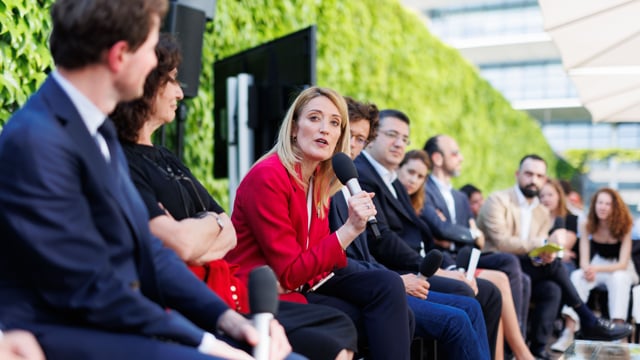[WATCH] ‘Youths told us Europe must do more on climate and Ukraine. We must respond’
Unpacking an EU Treaty is no mean feat, but Roberta Metsola is hoping she can find a balance between legislative changes and the more treacherous path to change the EU’s internal machinery


No day since Roberta Metsola’s election as president of the European Parliament earlier this year seems to have been anything but a ‘big day’.
On Europe Day, she is welcoming French president Emmanuel Macron to the official closure of the ambitious Conference on the Future of Europe, a citizens’ assembly whose 300 proposals for the EU’s further democratisation will be no mean feat.
Now she is squeezing in press conferences and journalists interviews’ every 10 minutes, right before meeting a well-attended event for youths to discuss engagement in politics through film comedy, bang in the middle of her regular visits to European cities. She has become one of the European bloc’s most recognisable faces on the diplomatic response to the Russian invasion of Ukraine, and even her presidency is marking somewhat of a historical crossroads for Europe’s future direction.
That’s because various proposals from the citizen-led Conference on the Future of Europe will require opening the books for treaty change, with past experience on Lisbon and Nice a bitter lesson from the past for policy-makers. Some member states are riled up by the prospect of losing unanimity on certain decisions deemed to be sovereign matters. For a microstate like Malta, losing the power of veto can radically alter the dynamics of power inside the EU, one that naturally shifts in favour of its major economic players.

“There’s a difference between changing the Treaty entirely, or arriving at certain solutions without having to lose unanimity,” Metsola says on opening this Pandora’s box of European negotiations.
“For Malta, unanimity on neutrality or family matters for example, must be retained. In the past we had to fight not to lose the right to appoint a Commissioner on such treaty changes first mooted 20 years ago… these are discussions that take their time.
“But there are subjects, such as immigration, environment, or rule of law, where you do not require unanimity. As President of the European Parliament, I have to seek that balance between what we can achieve now, and what truly requires Treaty change.”
The prospect is that, despite the brave words of the Conference’s co-president, the exuberant Belgian MEP Guy Verhofstatdt who described the proposals as “a matter of survival” for Europe, this bid to change its internal machinery might also result in a disappointing compromise. In France, Marine Le Pen’s showing in the elections is a stark reminder of the far-right’s destabilising threat to the EU project, while ‘bad boys’ Poland and Hungary show how the force of change in the union also depends on which party is elected to power, and who the prime ministers inside the Council are, ultimately.
“You will always have different realities in each member state… but you will always have millions of Europeans who are voting out of frustration at the political establishment. We must understand this feeling, and convince youths to go out and vote – that’s why they told us to do more on climate, or the war in Ukraine. As in France, we must win over this feeling, but also convince people.”
The success of the Conference in itself does bode well for the EU’s democratisation, even though Metsola seems less convinced of having such a citizen’s assembly as a permanent form of institution.
“There could be a way of seeking out citizens’ views on a proposed law, rather than wait for years to understand that a law does not work… but let’s not forget that it is the European Parliament that is directly elected to represent the people who chose us on all the subjects treated by the EP. Citizens’ consultation can be a part of this process.”
With the Russian invasion ever present on her agenda, Metsola says Malta must not stray away from its humanitarian obligations towards Ukraine. “Neutrality here is not in question,” she said of her calls for a deeper Security and Defence Union. “The EU army is not a new matter for the European Parliament, and every year or so the issue is brought up again… there is no need for Europe to compete with other alliances,” she said, in a reference to Nato. “Every member state should take its own decision… but in a matter of war, we must also speak of our own humanitarian obligations towards Ukraine.”

This article is part of a content series called Ewropej. This is a multi-newsroom initiative part-funded by the European Parliament to bring the work of the EP closer to the citizens of Malta and keep them informed about matters that affect their daily lives. This article reflects only the author’s view. The action was co-financed by the European Union in the frame of the European Parliament's grant programme in the field of communication. The European Parliament was not involved in its preparation and is, in no case, responsible for or bound by the information or opinions expressed in the context of this action. In accordance with applicable law, the authors, interviewed people, publishers or programme broadcasters are solely responsible. The European Parliament can also not be held liable for direct or indirect damage that may result from the implementation of the action.


























